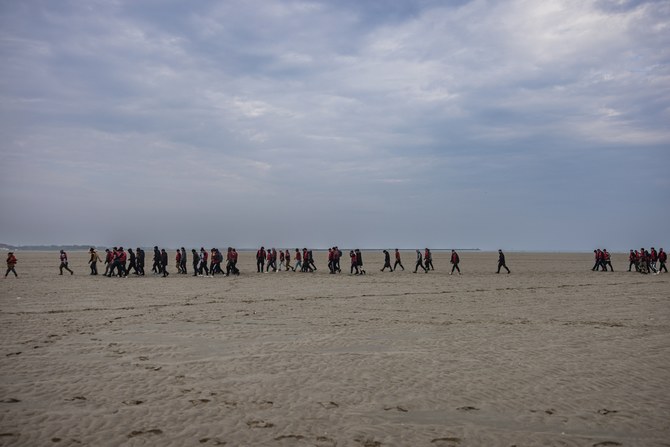Migration and climate change conspire to dent human certainty

https://arab.news/gjvgk
Last week, like most weeks, we witnessed yet another tragedy of people dying at sea due to their desperate attempt to seek a new life, a new beginning in a relatively safe European land. They wanted to leave behind the fear, uncertainty, poverty and all other types of adversity experienced in large parts of the Global South.
The number of confirmed dead or lost at sea off the Greek coastline was particularly large in this latest incident, which saw a boat full of migrants capsize, shattering the dreams of hundreds for a safer, more stable life.
This tragedy will be added to the many that came before it. At least 28 migrants died after their boat sank off the coast of Tunisia in March. A month earlier, at least 93 people perished when a wooden boat carrying migrants from Turkiye crashed on the rocks of Calabria in southern Italy. Many more such deaths are likely to be recorded as the haste to rush north increases, driven by conflicts, wars, civil strife and climate change, which have increasingly challenged the prospect of a secure future for many in their native lands.
Regardless of who is responsible, this trend is set to continue and likely increase in frequency for many reasons. Above all is the sense shared by many in the Global South, especially from countries like Syria, Afghanistan, Iran, Iraq, Venezuela, Colombia and, soon, Sudan, that they must jump while they can, as the challenges to a safe and secure existence continue to pile up. They are suffering due to dwindling resources, more frequent droughts and water shortages, and climate change, in addition, of course, to poor governance, corruption and the increasing cost of living.
As the summer months set in, news of water shortages and droughts are no longer an anomaly, even in previously water-rich countries
Mohamed Chebaro
Between January and March, some 36,000 refugees arrived in the Mediterranean countries of Europe, doubling the figure for the same period of last year. Western governments are racing to address this marginal yet developing trend, explaining the rising trend of countries apportioning the blame on human traffickers or friendly humanitarian groups. This is coupled with many countries’ efforts to tighten their immigration rules and the alleged provision of alternative secure passage for those they deem eligible.
The EU recently reviewed its migration and asylum rules to manage and distribute arrivals. This system requires member states to either take in migrants or make a payment for each relocation they refuse in an effort to ease the pressure on front-line countries, especially Italy and Greece, whose systems are buckling under the weight of new arrivals.
While the US continues to deter more arrivals by blocking its border, in parallel to increased scrutiny and rule changes that make the settlement requirements more difficult to fulfill, the UK has been debating its government’s long-awaited Illegal Migration Bill. If passed, it will make it next to impossible for refugees and migrants to settle in the country, using the threat of deportation to Rwanda for some, while housing others on floating barges, in an effort to send a strong signal to all those hoping to come that the UK is closed. The exceptions are nationals fleeing Hong Kong and Ukraine’s war.
As the summer months set in, news of water shortages and droughts are no longer an anomaly, even in previously water-rich countries. And this is likely to increase, coupled with warnings that 2023 will be the planet’s hottest year on record. Copernicus, the EU Earth observation program, last week declared there had been “a remarkable global warmth” in June, claiming that the first few days of this month breached the landmark 1.5 degrees Celsius increase compared with pre-industrial times. And this is likely to receive a further nudge via El Nino, a naturally recurring phenomenon where sections of the Pacific Ocean heat up, typically causing temperatures to spike across the world. It is expected later this year.
People are spurred to run when they sense their existence and the survival of their loved ones is at stake
Mohamed Chebaro
Against such a backdrop, water shortages will intensify and harvest disruption will increase, affecting livelihoods and pushing people to seek any means possible to flee to a safer place. Everywhere you look, the warning signs are there. South Africa is short of water and the Tigris and Euphrates rivers continue to shrivel, parallel to reports indicating that the world’s largest lakes and reservoirs are drying up, placing humanity’s future water security at risk due to climate change and unsustainable consumption.
Traditionally, people have moved to ensure their survival for various reasons, including ethnic or religious persecution or loss of land, but never before in the modern world have there been challenges at the scale of the brewing climate crisis. Meanwhile, global governance is in disarray due to both continuing and newly emerging geopolitical discords and conflicts, along with competition between forces vying for absolute political, corporate or technological dominance. People are spurred to run when they sense their existence and the survival of their loved ones is at stake.
In a more interconnected and globalized, yet increasingly cynical, world, in which various protagonists believe in shielding their own and turning a blind eye to the misery of others, the trouble soon will come to a region or place close to you. This could be through weaponized migration or major disasters pushing millions to pack what they can and flee, similar to what the world witnessed with the 2015 migrant crisis, when a confluence of factors, including the rise of Daesh, the Syrian civil war and other instability in the Middle East and Afghanistan, drove record numbers to make the crossing to Europe.
The ramifications of such events are still being felt in host countries in Europe and their environs, through the rise of populists with their empty rhetoric and the calls for more isolationist policies that offer a painkilling tablet to deal with the problem locally, instead of dealing with the root causes that are more complex and require a realistic approach based on multilateralism and transparency, which are in short supply in this era.
- Mohamed Chebaro is a British-Lebanese journalist, media consultant and trainer with more than 25 years of experience covering war, terrorism, defense, current affairs and diplomacy.










































